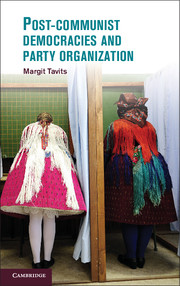1 - Introduction
Published online by Cambridge University Press: 05 June 2013
Summary
Why are some parties better able than others to establish themselves in new democracies? Specifically, why do some parties succeed electorally and survive and others die? Why are some parties better at becoming unified and cohesive in parliament while others remain dominated by individuals and are less successful in forming “responsible parties”? These questions are critical for understanding democratic consolidation. Numerous studies draw a direct link between party institutionalization and democratic consolidation (Bielasiak 1997, 2002; Birch 2003; Diamond and Linz 1989; Dix 1992; Elster, Offe, and Preuss 1998; Kitschelt et al. 1999; Kostelecky 2002; Kuenzi and Lambright 2005; Levitsky and Cameron 2003; P. Lewis 2000, 2001; Mainwaring 1999; McGuire 1997; Mozafar and Scarritt 2005; Olson 1998; Pridham 1995; Roberts and Wibbels 1999; Stoner-Weiss 2001; Tworzecki 2003). Stable parties generate clear expectations about the political actors, their behavior, and the overall structure and rules of party competition. Because of the stability and predictability, institutionalized parties can perform the fundamental functions of representation more effectively and have less incentive to break the democratic rules of the game. Innes (2002, 85) notes that if parties fail to provide a stable linkage between state and society, democracies will be vulnerable to instability and takeover regardless of “how efficient other institutions of state may have become.” Understanding what determines this institutionalization is therefore directly related to the deeper concern over the quality and survival of democracy.
- Type
- Chapter
- Information
- Post-Communist Democracies and Party Organization , pp. 1 - 22Publisher: Cambridge University PressPrint publication year: 2013



